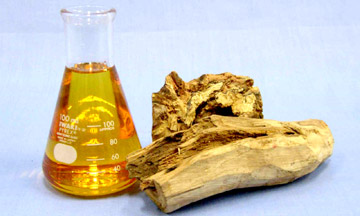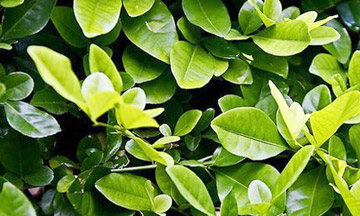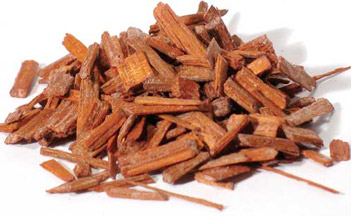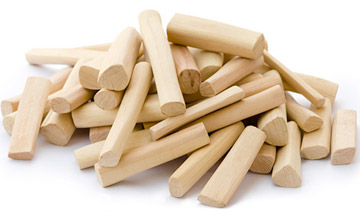|
Sandalwood fragrance oil:
Latest smuggling racket bared
By Kurulu Kariyakarawana
|

Samantha Gunasekara |
Sri Lanka Customs at the Bandaranaike International Airport detect
many illegal items being smuggled out of the country by individuals or
groups on a daily basis. From large sums of undeclared money to
valuables like gold and precious stones, narcotics, antiques and special
plants and animals which are a variety of items that were detected by
officials from time to time. Adding something new to the list is the
smuggling of fragrance oil made from Sandalwood, which is soon becoming
an endangered plant due to unlawful felling of sandalwood trees to
extract the oil which has a high demand in the international market
especially in India.

Sandalwood fragrance oil - the newest smugglimg commodity raking
in millions |
 |
| Coca plant
which resemble the sandalwood plant |
 |
| Red Sanders -
a priceless commodity |
 |
| Sandalwood
sticks |
This came to light when a recent attempt to smuggle out a large stock
of sandalwood oil worth millions of Rupees was thwarted by a Customs
official at the BIA in Katunayake. Two barrels of concentrated
sandalwood oil weighing over 50kilograms had been received by the BIA
air cargo unit through a courier agency.
Contraband
The contraband which was reportedly to be sent to an Asian country
had been declared under a different name. But when Customs officials
checked it on suspicion they found that it was concentrated sandalwood
oil. The stock of fragrance oil had been valued at over Rs.10million.
The case was then handed over to the Customs Cultural Heritage and
Bio Diversity Protection Unit for further investigations and it was
found that smuggling sandalwood oil was the latest modus operandi.
Special unit
The special unit had been investigating a series of sandalwood
smuggling attempts for the past five months and with the latest
detection they realised that the perpetrators have adopted a new ruse to
smuggle the contraband which goes undetected and also has a better
market price for the enhanced value added product.
In the past decades smugglers were sending sandalwood as chopped
pieces, sticks or blocks through various means. Since it was not a
prohibited item to export people had been taking them in large
quantities through legal channels.
But soon after the product was enlisted in the Flora and Fauna Act as
a prohibited item for export among several important other plant
products that is used for the manufacture of fragrance oil, officials
started to conduct detections and enhance surveillance operations.
Sandalwood was mainly smuggled into India and Pakistan where it was a
lucrative trade.
Customs officials have found that there were instances where even
families from countries like Pakistan had arrived merely to buy
sandalwood carried in personal luggage. In some cases families have
carried around 100kilograms of sandalwood divided among members under
the nose of Customs officials.
Raw
This was a difficult method and to carry sandalwood in its raw form
was too heavy and bulky. Smugglers looked for new ways to export the
product. Sending sandalwood in a concentrated oil form was successful
until the recent detection made at the airport. It is also learnt that
there is a better market for concentrated sandalwood oil than for mere
chunks of the same wood.
Customs Deputy Director ,Samantha Gunasekara, In-Charge of Cultural
Heritage and Bio Diversity Protection Unit said that currently there is
a trend rapidly picking up in the country to fell sandalwood trees for
smuggling purposes.
A number of instances were reported from various parts of the country
where fine grown sandalwood trees had been felled during the recent
past. Trees that were grown in the forests, privately owned estates,
domestic compounds as well as ones grown for medicinal purposes at the
Wickramarachchi Ayurvedic Hospital in Gampaha and Sunethradevi Pirivena
in Pepiliyana had been targeted by this new group of illicit
lumberjacks.
Most cases were reported from the central range in Kandy, Badulla and
Nuwara Eliya where a lush growth of sandalwood is reported. It is learnt
that the illicit wood cutters have even used advance methods like
electric chain saws to cut trees in a split second.. These expert
lumberjacks carry out this mostly in the night time due to less
disturbances from the public. When a tree is found they quickly tie a
rope around the top part of the trunk and pulling it towards the ground
and tie the other end to another nearby tree.
Then the cutters would do their job in few seconds and separate the
main trunk with branches and part with it without much ado. Sometimes
they come for the bottom portion of the trunk and the roots on a later
date when the situation is calmed.
Felled
Likewise a number of trees were felled during the past few months and
sandalwood is not the only 'victim 'of these smugglers. Rare plants like
Red Sanders (Red Sandalwood) and Wallapatta (Gyrinops Walla) another
rare plant used to extract expensive fragrance essence have become
'victims' of these illicit wood choppers.
There were even instances where these smugglers have tricked people
to give away their precious sandalwood trees for a mere Rs.5, 000 to
Rs.20, 000. On one occasion a person in Thalathuoya had been tricked by
wood choppers for his sandalwood trees.
They had claimed that they were not sandalwood but Nedun Trees
(Pericopsis Mooniana) and had asked for the trees in exchange for
several sandalwood plants. The housekeeper had happily agreed and let
the choppers cut his precious sandalwood trees and received several
sandalwood plants. Later he realised that the plants he had been given
were not sandalwood but Coca plants. The Coca plant from which Cocaine
is extracted from is similar externally to the sandalwood plant and only
an expert could tell the difference. Even in a move under a government
economic development project, Coca plants were distributed mistakenly as
sandalwood plants.
The Customs Bio Diversity Protection is keeping a close eye on these
incidents being reported frequently to track the perpetrators and put a
stop to this activity.
Exporting sandalwood is prohibited in countries such as India for
many years and notorious figures like Veerappan aka Sandalwood Veerappan
had engaged in felling sandalwood trees for ages and had smuggled
thousands of tonnes that incurred a loss of corers of rupees to the
Indian government.
Fragrance oil scam
Investigations into the fragrance oil scam is underway with Customs
officials going trailing the people responsible for the illicit
consignment of two barrels of concentrated sandalwood oil. It is found
that the courier agency responsible for the consignment was the same
company that couriered 323kilograms of Kothala Himbutu a few months ago.
Also the consigner was reportedly a private company in Colombo and is
being interrogated.
Sandalwood is a rare precious plant Sri Lanka had in abundance for
many years. The Customs Bio Diversity Protection Unit request the public
to be vigilant over this type of activity and to report such cases to
the relevant authorities immediately to save the valuable plant for
future generations. |

